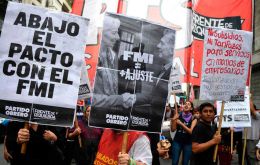MercoPress. South Atlantic News Agency
Tag: GDP
-
Friday, April 17th 2020 - 09:42 UTC
China's economy contracts 6,8% in Jan/March quarter, first time since 1992

China’s economy shrank for the first time since at least 1992 in the first quarter, as the coronavirus outbreak paralyzed production and spending, raising pressure on authorities to do more to stop mounting job losses.
-
Thursday, April 9th 2020 - 09:47 UTC
Peru launches economic stimulus plan equivalent to 12% of its GDP

While Latin America’s two largest economies, Brazil and Mexico, fret over the wisdom of pursuing large economic stimulus packages that could erode fiscal targets, Peru is going big and getting rewarded.
-
Tuesday, November 19th 2019 - 08:34 UTC
Chile's GDP expands 3.3% in 3Q, but prospects for 4Q are discouraging

Chile's gross domestic product grew 3.3 percent in the third quarter of 2019 compared with a year earlier, the central bank said on Monday. The market had predicted relatively strong growth during the July through September period, citing improving prospects for the country's all-important mining industry.
-
Tuesday, October 1st 2019 - 09:03 UTC
Brazil's national debt at a record high in August, 79.8% of GDP

Brazil's national debt rose to the highest on record in August, central bank figures showed on Monday, driven by a combination of increased interest payments, higher borrowing and a weaker exchange rate.
-
Thursday, September 19th 2019 - 10:12 UTC
Uruguay avoids recession, but the economy is stagnant

The Central Bank of Uruguay (BCU) released the report of the country's quarterly economic situation, which reports that the Uruguayan economy grew by only 0.1% year-on-year and 0.3% in the second quarter of the year, compared to the first three months of the year, when it registered a 0.1% drop.
-
Friday, September 6th 2019 - 09:50 UTC
Fed estimates US/China trade war could cost US$ 850bn in lost global trade

Trade policy uncertainty driven by the Trump administration's escalating dispute with China means hundreds of billions of dollars in lost U.S. output and as much as US$850 billion lost globally through early next year, research published this week by the Federal Reserve suggests.
-
Friday, August 30th 2019 - 09:43 UTC
Brazil economy rebounds in second quarter spurred by construction and industrial production

Brazil’s economy rebounded strongly in the second quarter after having shrunk in the first, official figures showed on Thursday, indicating Latin America’s largest economy comfortably avoided falling back into recession.
-
Saturday, July 20th 2019 - 09:50 UTC
Strong contraction of Uruguay's economy: GDP forecasted to grow 0.6% this year

Uruguay's Economy minister admitted on Friday that the country will end 2019 with a “very modest growth”, in the range of 0.6%, but was confident the economy would pick up in 2020 when the construction of a new pulp mill, with an investment of at least two billion dollars, is scheduled to start.
-
Thursday, April 11th 2019 - 09:31 UTC
The Trouble with Argentina’s Economy

With sustained economic growth, Argentina would be able to avoid another debt crisis. Although there are no silver bullets to put the economy on a more stable path, changing current macroeconomic policies would at least give the country a chance.
-
Saturday, February 16th 2019 - 11:10 UTC
Brexit has cost UK economy some £80 billion since the 2016 vote, says BoE policymaker

Brexit has cost the British economy at least £80 billion since the referendum and the shock of a no-deal divorce could see interest rates slashed, according to a Bank of England policymaker. Gertjan Vlieghe, an external member of the central bank’s Monetary Policy Committee, said that, since the June 2016 vote, 2% has been shaved off GDP.
